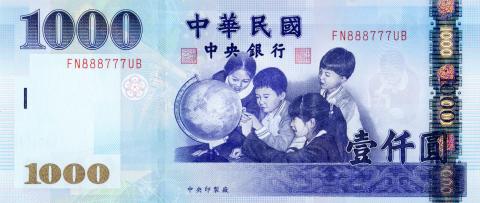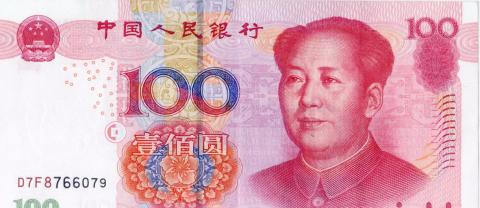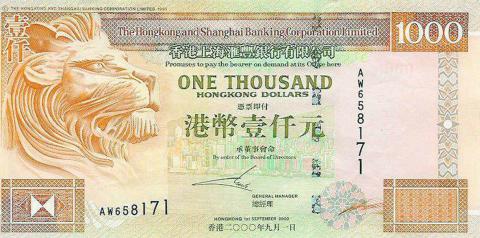A Greater Taichung man’s contention that the nation’s most common bills in circulation contain a printing error that has gone unnoticed for decades has sparked a heated debate.
Huang Pai-tsun (黃百村), a bedding merchant, said that the Chinese character for “one” (yi, 壹) on all NT$100 and NT$1,000 banknotes is incorrect.
The upper part of the character yi should be shi (士, scholar), with the top horizontal stroke longer than the bottom one, Huang said.

Photo: Lin Liang-che, Taipei Times
However, the banknotes in circulation have it wrong, he said, with the character written as tu (土, land or earth), which has a top horizontal stroke that is shorter than the bottom one.
Huang said he has double-checked with standard Chinese dictionaries and computer word processors and verified that the banknotes contain a misprint.
However, an official from the central bank’s currency issuance department denied that it was a misprint.

Photo: Lin Liang-che, Taipei Times
“There is no mistake in the Chinese character on the bills,” the official said.
Officials from the central bank’s Central Engraving and Printing Plant added that the printed characters on the currency bills were designed specifically for aesthetic purposes and to guard against counterfeiting, and, as such, differ from the regular written form.
“All printed characters on the bills were uniquely designed. If they were the same as those printed by a computer, then the bills would be easy to counterfeit,” an official said.

Photo: Lin Liang-che, Taipei Times
Yang Meng-chu (楊孟珠), a Chinese-language teacher at a senior-high school in Greater Taichung, is unconvinced, saying she thinks the central bank is wrong.
According to the Kangxi Dictionary (康熙字典), the root character for yi is shi; the central bank has therefore made a blunder by misprinting the root character as tu, Yang said.
A look at banknotes containing the character yi in China, Hong Kong and Macau show that they are printed with the root character shi.
“The Taiwanese government has always stressed that we are a country that uses the traditional Chinese system of writing. We should therefore be careful to follow the proper form,” Huang said.
“The central bank has made an error on the circulating bills. This has become an international joke. As China, Hong Kong and Macau all use the correct Han Chinese form, I want to see the central bank rectify the error at once. We should not allow this mistake to continue,” he added.
Money collector Yang Chuan-ming (楊川明) appeared to support Huang’s findings, saying he had made a careful study of all banknotes issued from the Japanese colonial era to the period right after World War II and found that all were written in the proper form.
“However, the [print] on the bills issued by the Chinese Nationalist Party (KMT) government starting from 1949 were all changed to tu,” he said.
In 1949, the KMT government had to deal with several crises, including soaring inflation and social unrest, and had to undertake a major fiscal restructuring, Yang Chuan-ming said.
“That was the time the KMT government mandated the conversion of one New Taiwan dollar for every 40,000 old Taiwan dollars. It was the start of the New Taiwan currency, with the issuance of NT$0.01, NT$0.10 and NT$100,” he said.
“From then on, the yi character on currency bills almost all had the wrong root on top. Very few bills got it right since then,” he said.

Taipei has once again made it to the top 100 in Oxford Economics’ Global Cities Index 2025 report, moving up five places from last year to 60. The annual index, which was published last month, evaluated 1,000 of the most populated metropolises based on five indices — economics, human capital, quality of life, environment and governance. New York maintained its top spot this year, placing first in the economics index thanks to the strength of its vibrant financial industry and economic stability. Taipei ranked 263rd in economics, 44th in human capital, 15th in quality of life, 284th for environment and 75th in governance,

The Sports Administration yesterday demanded an apology from the national table tennis association for barring 17-year-old Yeh Yi-tian (葉伊恬) from competing in the upcoming World Table Tennis (WTT) United States Smash tournament in Las Vegas this July. The sports agency said in a statement that the Chinese Taipei Table Tennis Association (CTTTA) must explain to the public why it withdrew Yeh from the WTT tournament in Las Vegas. The sports agency said it contacted the association to express its disapproval of the decision-making process after receiving a complaint from Yeh’s coach, Chuang

Control Yuan Secretary-General Lee Chun-yi (李俊俋) tendered his resignation last night, admitting that he had misused a government vehicle, as reported by media. His resignation was immediately accepted by the Control Yuan. In a statement explaining why he had resigned, Lee apologized for using a Control Yuan vehicle to transport his dog to a pet grooming salon on May 20. The issue first came to light late last month, when TVBS News reported that Lee had instructed his driver to take the dog to the salon. The news channel broadcast photos that it said were taken by an unnamed whistle-blower, which purportedly showed the

A former officer in China’s People’s Liberation Army (PLA) who witnessed the aftermath of the 1989 Tiananmen Square massacre has warned that Taiwan could face a similar fate if China attempts to unify the country by force. Li Xiaoming (李曉明), who was deployed to Beijing as a junior officer during the crackdown, said Taiwanese people should study the massacre carefully, because it offers a glimpse of what Beijing is willing to do to suppress dissent. “What happened in Tiananmen Square could happen in Taiwan too,” Li told CNA in a May 22 interview, ahead of the massacre’s 36th anniversary. “If Taiwanese students or